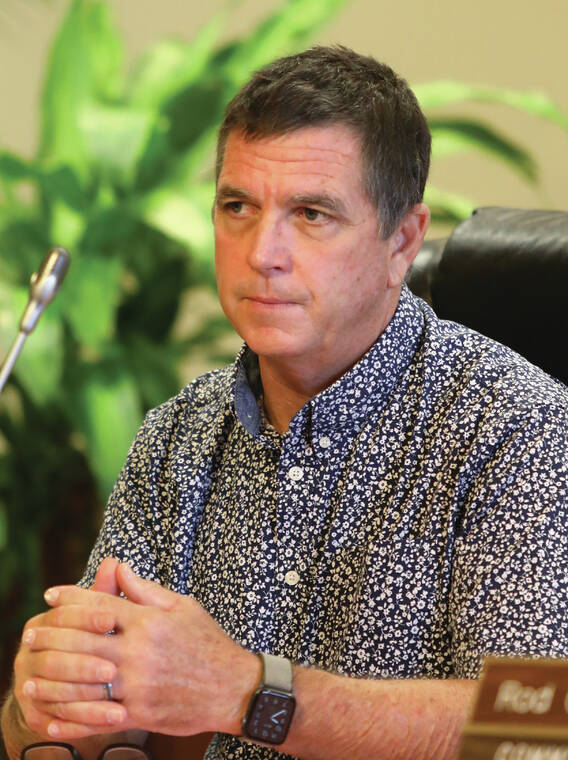Top cop search down to 5
The number of candidates in the running to become Hawaii County’s top cop is down to five.
The number of candidates in the running to become Hawaii County’s top cop is down to five.
That’s according to Charisse Correa, secretary for the Hawaii County Police Commission.
ADVERTISING
Correa said Tuesday the commission is “seeking permission right now to unmask their names.” She added that once permission is given, the identities of the finalists will be made public.
“We’re going to have two special meetings in Hilo and Kona,” she said. “It will be open session, open to the community to give input.”
Going into last Friday’s commission meeting in Kona, 21 out of 44 applicants were in the running to succeed Paul Ferreira, who retired Aug. 31 after 40 years in the Hawaii Police Department, the last six as police chief.
Kenneth Bugado, who was Ferreira’s deputy chief, is the acting police chief pending the swearing in of Ferreira’s successor.
The position pays $153,270 annually, about $9,300 less than the highest paid county official, the mayor at $162,582. The chief is tasked with overseeing 484 sworn personnel, in addition to civilian employees, that serve the island’s more than 200,000 residents. According to Civil Beat’s database of public employee pay, Honolulu’s police chief is paid $205,800, Maui’s police chief makes $200,000 and Kauai’s chief earns $137,022.
The deputy chief will be selected by the future chief appointed by the commission.
The commission, as it has the past several monthly meetings, took testimony on all agenda items, including the selection of a new chief, in its Friday meeting. But all substantive discussions and decision making by commissioners have been done in private executive session, away from the scrutiny of the public and media, after public testimony was taken.
Brian Black, executive director for The Civil Beat Law Center for the Public Interest, an independent organization that describes itself on its website as an “advocate for open government in Hawaii,” submitted written testimony urging the commission to “hold the selection process for the next chief of police in open session (absent the rare need to discuss highly personal information about a candidate).”
Black, an attorney, also testified via Zoom at Friday’s meeting.
“I would strongly encourage the commission against holding executive sessions closed to the public for the selection of the chief process,” he told commissioners. Black added he’d be happy to discuss options for the commissioners to comply with the state’s open meetings law, also known as the “Sunshine Law.”
In his written testimony, Black said the law “strongly favors open meetings” and pointed out that willful violation of the open meetings law is a misdemeanor.
“A commission cannot hold an executive session simply because it wants to do so or because it has done so in the past,” Black wrote. “Knowing that there are severe limitations on closing the doors to the public when hiring the next chief of police, failure to hold an open session is an intentional violation of the Sunshine Law that will expose commission members to criminal prosecution.”
Police Commission Chairman John Bertsch told Black during Friday’s meeting that once the commission identifies the finalists for the position, “we’re going to ask the applicants we have selected for their permission to share their names and go public.” He said the commissioners still were using numbers assigned to the applicants by the county’s Human Resources Department to replies on a questionnaire sent to the candidates by the commission.
“The moment that we receive permission to go public with what we would consider … the finalists, we are 100% open and transparent,” Bertsch said. “… I yearn to share the information, because we’ve got some fantastic candidates on paper. And this commission looks forward to meeting and speaking with those individuals in person.”
Bertsch told Black “it’s our goal to be as completely transparent as possible” while whittling down the applicants to the finalists to be presented to the community.
“I think the community would be interested in seeing the criteria that’s being used and watching the process … the commission is using to narrow down the candidates to those … that become the finalists,” Black replied. “… I think the courts have been clear — especially if you don’t even know the names — that the standard exception that’s been used in the past for privacy of personnel decisions and things like that would not be a basis for holding a closed session.”
Describing the questionnaires as “pretty generic,” Bertsch said county HR had requested the questions “remain protected” because of county hiring practices and the possibility of the questionnaires being used again.
Black said he’s more concerned about commissioners’ private deliberations regarding candidates than disclosure of the questionnaires themselves.
“I’m concerned about the fact that they’re conducting executive sessions already in this process,” Black told the Tribune-Herald Tuesday. “They were looking at packets that were not identified by name, and they were discussing those individuals. And that’s not something you can do in executive session.”
The Tribune-Herald reached out to Bertsch Tuesday, but didn’t receive a reply in time for this story.
Email John Burnett at jburnett@hawaiitribune-herald.com.




